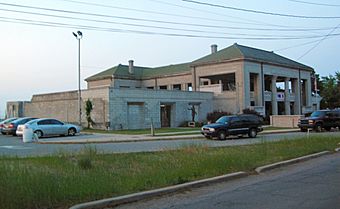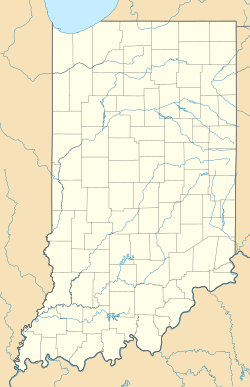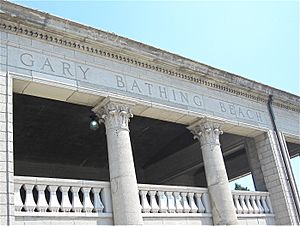Gary Bathing Beach Aquatorium facts for kids
Quick facts for kids |
|
|
Gary Bathing Beach Aquatorium
|
|
 |
|
| Location | One Marquette Dr., Marquette Park, Gary, Indiana |
|---|---|
| Area | 6 acres (2.4 ha) |
| Built | 1921 |
| Architect | George Washington Maher |
| Architectural style | Prairie School, Classical Revival |
| NRHP reference No. | 94001354 |
| Added to NRHP | November 25, 1994 |
The Gary Bathing Beach Aquatorium is a unique building found at Miller Beach in Marquette Park, Gary, Indiana. It was once known as the Lakefront Park Bathhouse. A famous architect named George Washington Maher designed it, and it was built in 1921. This building was added to the National Register of Historic Places on November 25, 1994. Today, it is a museum that celebrates the history of flight. It honors two important groups: Octave Chanute and the brave Tuskegee Airmen.
This building first opened in 1921 as a place for people to change clothes, shower, and use the restrooms. It was a very important spot for the Miller Beach community for many years. The building is special because it was one of the first to use a new way of building. It used pre-made concrete blocks that fit together. About 90% of the building was made using only six basic types of these blocks. The most common one was called the T-Block, which was an early version of the concrete blocks we see today.
By the 1960s, the building started to fall apart. It was closed to the public in 1971 and boarded up.
The Aquatorium was saved from being torn down by a group called the Chanute Aquatorium Society in 1991. This group even made up the word "Aquatorium." It means "a place to view the water." They wanted a new name to show that the building was no longer just a bathhouse.
Contents
A Museum of Flight
The Aquatorium is no longer a place for changing or showering. Instead, it is now a museum that honors important figures in flight history.
Honoring Octave Chanute
One person honored here is Octave Chanute, who is sometimes called the "father of flight." Chanute did some of the first successful glider flights in human history. He flew his gliders in the tall sand dunes very close to where the Aquatorium stands. His successful experiments and glider designs helped the Wright brothers a lot. Their work led to the first powered flight at Kitty Hawk.
Celebrating the Tuskegee Airmen
The museum also honors the Tuskegee Airmen. These were African American pilots and airmen who were pioneers in aviation. They played a huge role in helping to end segregation in the United States armed forces. Many thousands of dollars have been raised to fix up and improve the building.
Restoration Efforts
Lee Construction Management helped to restore the Aquatorium. In the spring of 1998, they removed the old east showers. Then, in January 1999, they started building a new section. By the spring of 2000, major work was done on the second floor. This made the first-floor areas waterproof, so museum exhibits could be built below. The first stone for The Tuskegee Airmen Wing of the new museum was placed on January 17, 1999.
See also
 | Audre Lorde |
 | John Berry Meachum |
 | Ferdinand Lee Barnett |




